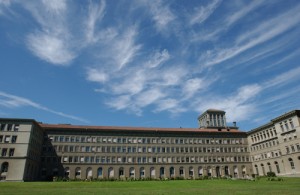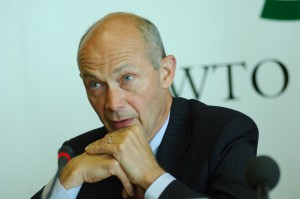WTO; Future of multilateral trade, the Bali round and a new Director-General
View(s):By Feizal Samath
(Geneva) – In the halls of the World Trade Conference (WTO) headquarters in Geneva, Switzerland, discussion and often gossip is centred on the future of multilateral trade and this body.
The ‘chatter’ over the election of a new Director General (DG) in September to replace Pascal Lamy, who has served two terms since 2005, pales into insignificance when comparing the discussion about the next round of multilateral trade negotiations, which according to many observers, is getting nowhere.

WTO Headquarters
For example, when the announcement of two candidates – who go into the final round election – for Lamy’s post, was announced on Friday April 26th, there was hardly a whimper from the journalists who crowded into a conference room at the WTO. The questions were there but not many and reporters scrambled out of the room after the briefing. For the record the two candidates out of five contenders (that went into the second round) are Herminio Blanco (Mexico) and Roberto Carvalho de Azevêdo (Brazil). The other three were Ms Mari Elka Pangestu (Indonesia), Tim Groser (New Zealand) and Taeho Bark (Republic of Korea). They along with Alan John Kwadwo Kyerematen (Ghana), Ms Anabel González (Costa Rica), Ms Amina C. Mohamed (Kenya) and Ahmad Thougan Hindawi (Jordan) make up the nine candidates who were proposed by their respective Governments. The successful candidate needs the consensus of the General Council made up of the 159 member countries (including Sri Lanka) of the WTO. While the process is clear in the selection by the Council, it could also be complicated. The candidates went through two rounds of consultations and consensus-seeking after which the preferred candidates go to the third and final round. The guidelines provide for the Governments of candidates who get the least support at these consultations to withdraw their candidate. However that is not compulsory and in this case, a few ‘defeated’ candidates are still in the race which could, if no single candidate emerges by the end of the month, likely lead to an election.
Having said that, the failure of the Doha round of trade negotiations and uncertainty as to whether the next round in Bali (the 9th Ministerial-level conference) in December would take forward the global trade movement, on which rests smooth and effective trade, investment and service flows from country to country, is top on the minds of many experts here.
To delve into some background for the benefit of readers not clued into global trade and international trade negotiations, the Doha trade proposals were launched by the WTO in 2001, seeking to give more priority to poor countries in improving access to their farmers to wealthier markets. It also covered trade in manufactured goods, agriculture and services and a host of other things. But the negotiations have plodded on from one round to another with bigger countries like the US and Japan putting the brakes on to support their local farmers and fishermen. Inevitably no agreement has been reached and Bali could be curtains for a Doha-like deal if there is no consensus. Most experts here say the clock is ticking for multilateral trade rules which are now somewhat being replaced by regional agreements or bilateral arrangements like the arrangements Sri Lanka has with some countries. In the last count, there were hundreds of such arrangements which countries find less cumbersome to follow than wait for a new trade deal from the WTO which, if it happens, is a pity. The word here is that Lamy and his officials need to resurrect the Doha proposals in some form instead of letting it die but there is one problem; Lamy won’t be around and it would be a hard task for his successor with just a few weeks in the job. In this context the release here on April 24 of a new report titled “The Future of Trade: The Challenges of Convergence” makes interesting reading and could help steer the organisation. Journalists, not surprisingly, are cynical about the report which tries to define the future of trade and put the WTO back on track.“We have seen many similar reports in the past but nothing has come out of them,” said one experienced trade journalist, adding: “I am rather skeptical about this one too.”

Pascal Lamy
The report was prepared by a panel convened by Lamy and released, ironically, just a few months away (on April 24) from his exit from the organisation. So, was the exercise, launched a year ago, to rubber stamp the outgoing DG’s work in the organization? One could never tell.
Lamy sounded confident that the report has a lot of positives. “This report offers ‘food for thought’ to our members as they think about their medium to long-term trade policies and also about the medium to long-term prospects for this organisation. The report does not offer quick fixes to conclude the Doha Round; it was not intended to do so. What is says about the Doha Round is that there is a political imperative as well as an economic rationale to conclude it. But many of the issues addressed in the report are of direct relevance to unlocking the Doha Round,” he told diplomats and journalists who assembled in a conference room for the launch if the report.
The eminent panel comprised – Talal Abu-Ghazaleh (Chairman/Founder, Talal Abu-Ghazaleh Overseas Corporation, Jordan), Sharan Burrow (Secretary-General, International Trade Union Confederation, Brussels), Helen Clark (UNDP Administrator, New York, Thomas J. Donohue (President and CEO, US Chamber of Commerce, Washington), Frederico Fleury Curado (President and CEO, Embraer S.A, Brazil), Victor K. Fung (Chairman of Fung Global Institute and Honorary Chairman of the International Chamber of Commerce, Hong Kong), Pradeep Singh Mehta (Secretary-General, CUTS International, India), Festus Gontebanye Mogae (former President of Botswana), Josette Sheeran (Vice Chairman, World Economic Forum, Geneva), Jürgen R. Thumann (President, BUSINESSEUROPE, Brussels), George Yeo (former Foreign Minister, Singapore and Vice Chairman of Kerry Group Ltd), and Yoshiaki Fujimori (President and CEO, LIXIL Group Corporation and LIXIL Corporation).
In its conclusions, the report said that Governments face a four-pronged convergence challenge. They are:
- Convergence among members: this first convergence concerns negotiations among members, as well as their sequencing, in order to achieve progressive, development friendly convergence of their trade regimes.
- Convergence of non-multilateral trade regimes with the multilateral trading system: this second convergence relates to the gradual alignment of different trade regimes, in particular preferential trade agreements and the multilateral trading system.
- Convergence between trade and domestic policies: this third convergence requires deeper coherence between trade and other domestic policies, such as education, skills and innovation.
- Convergence between trade and public policy non-tariff measures: this fourth convergence requires greater coherence between trade rules and policies, norms and standards in other areas of international cooperation.
The report discusses the contribution that trade opening has made to growth, development and prosperity. It also discusses the challenges of managing jobless growth, high unemployment, poverty, inequality, the environment and sustainable development, and the role of trade as well as investment in this context.
It examines certain transformational factors that have shaped trade in recent years and will continue to do so in the future. These include increasing globalization, geographical shifts in patterns of growth, trade and investment, technological advances, the rise of international value chains, the proliferation of preferential trade agreements, and the growing influence of non-tariff measures.
The report contains a number of recommendations for possible action which, it says, deals with specific issues that have either been raised in other contexts, including the Doha Round, or which the panel believes warrant consideration.
The report noted that the issues in the Doha agenda will not disappear and that not fulfilling this collective undertaking could put at stake the multilateral trading system itself.
It said while the WTO is not responsible for managing public policy in key areas of the economy such as health, safety, environmental quality and the rights of labour, “we believe the WTO must find ways of ensuring convergence between the underlying objectives of trade opening and public policies”.
It said members have an obligation to pursue a transparent approach in their dealings. “They should improve their record for observance of their transparency obligations in terms of policies, measures, and data”.
On the issue of reaching out to stakeholders and the public at large, the report said the WTO should engage more directly with non-governmental stakeholders, including business, trade unions, academics and non-governmental organisations, as well as the public at large.
(The writer was part of a group of Asian and African editors attending a week long seminar on the multilateral trading system of the World Trade Organisation (WTO) hosted by Friedrich-Ebert-Stiftung (FES) and WTO in Geneva. Next week: The WTO, consensus, dispute mechanism and what it means to the public at large).
Follow @timesonlinelk
comments powered by Disqus





















